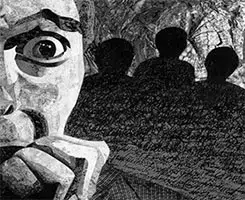 If we analyze the etymology of confabulation , we will arrive at confabulatio , a word from the Latin language. The act and result of colluding or plotting is called collusion.
If we analyze the etymology of confabulation , we will arrive at confabulatio , a word from the Latin language. The act and result of colluding or plotting is called collusion.
The verb confabulate , for its part, can be used to name the action of telling lies or fables or establishing an agreement to develop an illicit plan . For example: “That's a conspiracy! I will not allow my name to be defamed with falsehoods” , “The president discovered a conspiracy of several officials who intended to destabilize his government” , “A retiree was the victim of a conspiracy and lost all his savings” .
A conspiracy, therefore, can consist of spreading lies with the aim of harming someone. It should be noted that the term is used in a derogatory sense: a person does not usually admit that he carried out a conspiracy, but rather accuses another person of having done so.
When studying the etymology of the term confabular we can find the verb confabulari , coming from Latin, which translates as "conversing between two or more people and putting together a plan together", but also refers to "telling stories between two or more people." ».
Although at first glance this last meaning may seem strange, it arises naturally from the lexical components of the word confabulari : the prefix con- gives it the connotation of "everything, together", while the verb it modifies ( fabulari ) can be translate as "tell fables , speak."
Suppose that, in the media of a certain country, complaints and accusations involving the governor of a province begin to be published. This situation threatens the image of the leader. By way of defense, the governor in question claims that he is the victim of collusion on the part of the opposition: in his words, the accusations are false and the complaints are based on lies. According to the governor, everything is due to the opposition's intention to gain power.
Conspiracies can also be alliances between several individuals to carry out an illegal, illegitimate or unethical activity. If three co-workers agree to go before their boss to accuse another worker of being inefficient and problematic just because they don't like him, they may be said to be colluding.
 In this last example you can see that nuance of "joint plan" that is detailed above in the etymology of the term: the prefix con- gives us the idea of group work, of the action of several people in pursuit of a plot. which, in this case, seeks to harm a third party through the dissemination of a false story , a "fable."
In this last example you can see that nuance of "joint plan" that is detailed above in the etymology of the term: the prefix con- gives us the idea of group work, of the action of several people in pursuit of a plot. which, in this case, seeks to harm a third party through the dissemination of a false story , a "fable."
In the field of psychiatry, we speak of confabulation to describe the phenomenon characterized by the invention of certain experiences with which the subject completes empty spaces in his memory . It is important to note that the person is not aware that these memories are false, that they have never taken place in reality, and he tells them to others with complete ease, although he very soon forgets them and begins to invent new ones.
Chronic alcoholism and some organic brain syndromes often lead to the appearance of confabulation. It is not uncommon to witness this behavior in people who suffer from these disorders , when they tell us their supposed plans (things that we know they will not do, mainly because their illness does not allow them) or the things they have done the day before, for example.
It is important not to confuse this concept with that of fabulation : although both coincide in the fabrication of stories and their subsequent dissemination, the fabulating subject is aware of his lies .
